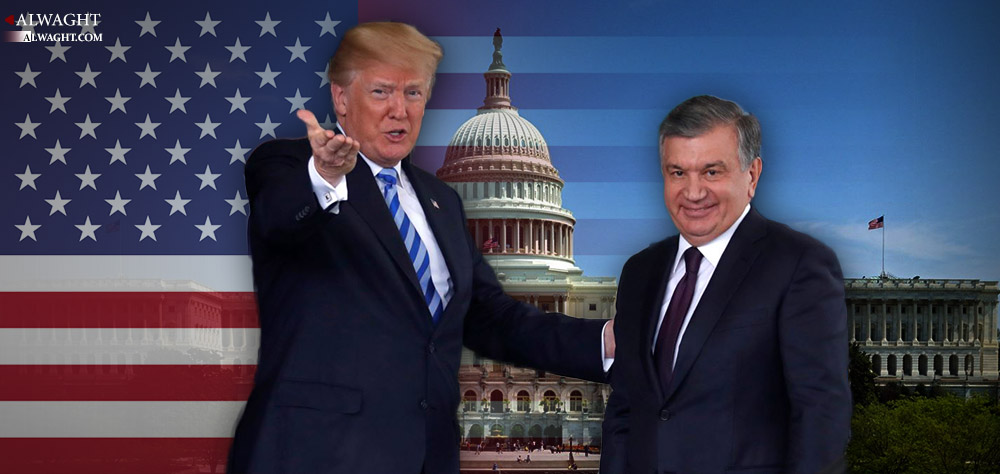Alwaght- Uzbekistan President Shavkat Mirziyoyev’s visit to the US on May 15 is viewed as an important development in the two sides’ relations. The visit was the first since Mirziyoyev became president in 2016 and the first for an Uzbek president in 16 years. The last visit to the US by an Uzbek president took place in 2002 by Islam Karimov who died in 2016.
The Washington-Tashkent relations have been chilly since Uzbekistan’s security forces under Karimov clamped down popular anti-government protests in Andijan city in the east of the country. But things changed when two years ago Mirziyoyev assumed the power in the country, a former Soviet republic. He pushed forward with political and economic reforms and showed a will for more friendly relations with the West, particularly with the US. However, the mid-May trip does not come simply because Tashkent’s new leader has adopted new policies. Rather, the US on the other side has felt some necessities to rebuild the bilateral relations with the Central Asian state.
Afghanistan war
The Afghanistan case, certainly, will be one of the main issues on the two sides’ list of cases to be discussed as they take further steps towards expansion of cooperation. After the 9/11atatcks on the American soil, the US invaded Afghanistan under the ruse of battling the terrorism but originally sought to enlarge its hegemony in the post-Cold War world. Uzbekistan was an important party contributing to the Washington’s plans in Central Asia. From 2001 to 2005, the Uzbek government allowed the US forces to use its Karshi-Khanabad Air Base in southern Uzbekistan. The US at the time deployed a number of the C-140 transport aircraft, dozens of Black Hauk combat helicopters, and some 1,500 troops to the airbase which was essentially used to back the military operations of the US and NATO members states in Afghanistan.
In 2009, when the possibility of closure of the Kirgizstan-based US air force’s Transit Center at Manas loomed, then NATO forces’ commander in Afghanistan General David Petraeus flew to Uzbekistan twice to discuss with Karimov possibility of allowing the US forces to reuse the Uzbek air base. The efforts were made by the American general because it was crucial for the US to have a large military base in Central Asia to cover the ongoing Afghanistan military campaign. But the Uzbek leaders and their American counterparts so far declined to confirm that Tashkent allowed its southern air base to serve as a replacement for that of neighboring Kyrgyzstan.
Meanwhile, President Trump has pressed Pakistan after he accused Islamabad of not doing enough to support the US-led campaign in Afghanistan, where the Trump administration has resorted to a new war strategy. This automatically catalyzed a US notion of the need to rebuild the relationship with Uzbekistan. The US has two military sites operating on the Pakistani soil, Shamsi and Shahbaz air bases. But as the Washington-Islamabad ties bear risks of deterioration in the future, the continuation of operations from these two Pakistani bases increasingly immerses in uncertainty.
As a result, Trump during his press conference with his Uzbek counterpart noted that the White House urged more job to be done to ensure peace in Afghanistan, adding that Uzbekistan is one of the regional parties that has to take a bigger share in the efforts towards this goal. The American leader also hailed close economic and military cooperation with Tashkent.
“It's a great honor to have the President of Uzbekistan with us. He's a highly respected man in his country and throughout. We've been working very closely together on different things,” Trump said in the Oval Office. He mentioned trade and military equipment sales as areas of cooperation.
Mirziyoyev, on the other side, talked about a ”new period of strategic cooperation” with the US. The trip to Uzbekistan of President Ashraf Ghani of Afghanistan in early December last year played a key role in restoring the Uzbekistan role in US military strategy in Afghanistan.
Competing with Russia
Central Asia, a region hosting new states built on the ashes of the former Soviet republics, over the past two decades have been a theater for competition of the global powers fighting for spheres of influence. The region neighbors the two powers of China and Russia, is close to the strategic West Asia region, and is a historical trade route between the East and West. The US has been seeking to penetrate in the former Soviet republics as a key strategy to take on Russia and China, using a set of tactics, including stirring “color revolutions” to bring to power pro-Western governments in the region.
Washington takes advantage of the regional states’ economic, technological, and military needs to get toeholds there. The Uzbek president’s press advisor Kumail Alamchev has told the media that during the visit the two countries signed over 40 cooperation documents that will bolster the bilateral trade in various areas to $8.5 billion. Moreover, Uzbekistan’s foreign trade ministry announced that Washington and Tashkent signed an agreement ensuring US advocacy for Uzbekistan’s bid for the World Trade Organization accession. The document will make Washington to be bound to a set of steps. It will help Tashkent prepare documents for handover to the WTO, contribute to calculations on what happens when the country joins the international trade body, and also issue licenses to the textile and other Uzbek industries according to the international standards.
As a conclusion, the boosted Washington-Tashkent relations heralds intensified US-Russia rivalry for a deeper regional foothold in the future.



























